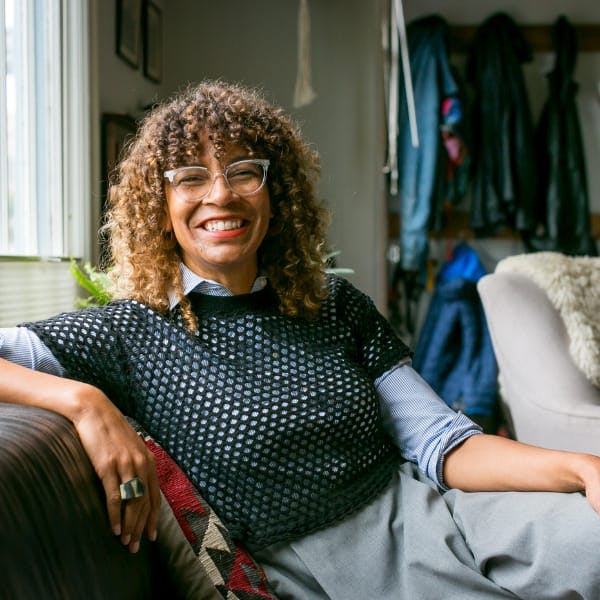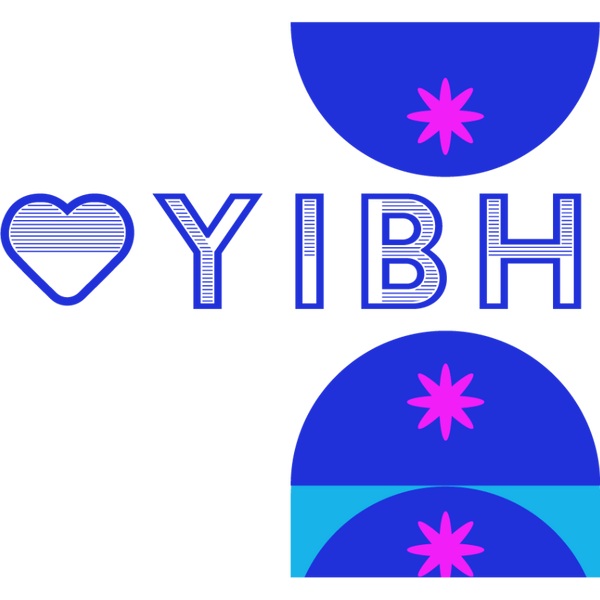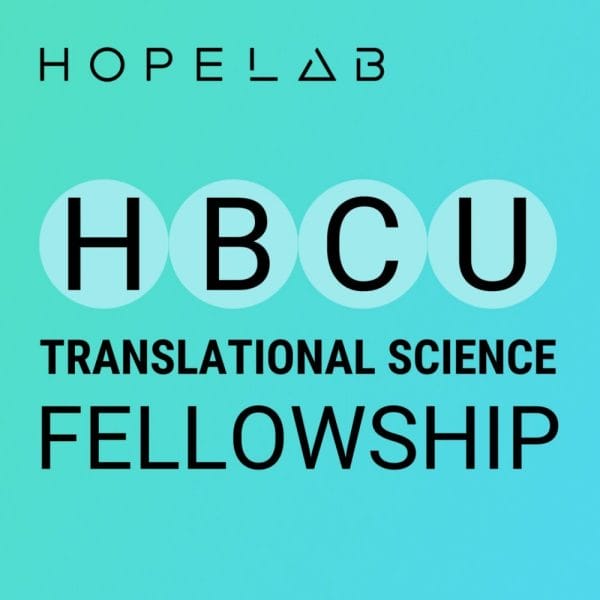I don’t even feel like you can do health work without talking about equity. You can’t separate them anymore.
Tinkering with a New Chapter: Fostering a Culture of Equity, Innovation, Design, and Co-creation
A few years back, we bid farewell to one of our brightest, most dynamic designers, Julie Tinker. This month, we have the joy and privilege of welcoming her back.
In her first tour at Hopelab, Julie served as the Design Lead, where she helped build a culture of design and worked closely on the development of Vivibot, our positive-thinking chatbot, and Nod, an intervention focused on social connection for college students. Julie returns to Hopelab in a role that is a major part of our next chapter: helping us foster a culture of equity, innovation, and co-creation.
Sometimes — often actually — growth requires speaking some uncomfortable truths. One such truth for us is that the equity-focused work that Julie moved on from Hopelab to pursue was work that we were, at the time, not quite ready to do. In the crucible of the past two years, we’ve taken a hard look at the kind of organization we are and who we want to be — what we do well, where we are positioned on the leading edge of health tech and design, and where we can do better. As we strengthen our systems of equity and accountability within our teams and across our partnerships and products, we can’t think of anyone better to join us at the forefront than Julie.
Shortly before launching into her new role, Julie sat down with us to talk about where she’s been, what called her back, and how doing scary work is also an opportunity for joy.

[Interview edited for length and clarity]
Hopelab: What made you decide to make the return to Hopelab?
Julie: I had a great experience working at Hopelab the first time around, from the people to the work that we did to the research and design being partnered together so well.
When I left Hopelab, it was a difficult leave, because I was like, I love what I’m doing, but I have these burning questions around health equity. What does it mean to try and operationalize that within an organization and make that the focus and make that the center of your work, right?
So, I left with I feel a pretty specific focus. I had some questions I wanted to answer.
The interesting thing about a lot of organizations is they may have a huge research division and they may have design, but those things have not really been brought together yet. And human-centered design processes and design research is relatively new. But at Hopelab that approach is already there, and it’s an approach that I felt strongly that I wanted to return to.
I also wanted to bring more conversations about equity and how we actually design things to lead to more equitable health outcomes. That’s what started the whole process in the first place of me getting back in touch with the organization, saying, “Hey, these are the things I’ve been thinking about. What’s going on for you? Is there a place for me there?”
Hopelab: How do your background and previous experiences position you to help your colleagues and partners create a more equitable world for young people?
Julie: At this point, my focus is equity and innovation and design, and I’m returning to Hopelab in a role that’s exactly that. Let’s start here and see what it looks like.
It’s exciting! And so much more honest, I think, to be like, “We don’t know exactly how this fits in.” Especially when the goal is to approach equity in a way we haven’t done before. I was sort of saying, “Okay, if we’re going to think about how to generate more equitable health outcomes, we have to go upstream.” So what are the processes — how do we go into communities currently and design with them and co-create and evaluate what the needs are? We’re going to need to look at all of that.
And then how do we use research, and what are the bodies of research that we’re pulling from? And how have they and have they not been equitable, and what is the bias that exists in research, and can we be more transparent about that? Because it’s definitely there, right? So finding the balance of trusting science, but also saying, “Yeah, you know what though? This science comes from a slanted place as well. So if we really want to inject equity into our work, we’re going to have to look at this.”
So that’s what I’m proposing we do.
Hopelab: That is massive.
Julie: Right? It’s a little scary because I think I want us all to be a little less certain, and I know that’s a hard thing to do. But it’s kind of like, if anyone can do this, we can do this at Hopelab.
We’re all about the benefits of growth mindset, but growth mindset also means being slightly uncomfortable. I want to ask people to be slightly uncomfortable.
But then on the flip side, let’s harness the power of doing that together, too.
I think [equity work] can feel judgmental, and we lose sight of like, yeah, but we’re doing this with the goal of actually making a bigger change and impact. How do we harness that so that’s what fuels the work? And then — certainly this sounds a little bit silly I’m sure — but what is the joy and the celebration in doing that?
It’s actually really amazing that we would even consider something like decolonizing research. To even say those words to me is very exciting.
To ground it a little bit more in my personal experience, I’m a multi-racial woman who grew up in this country. I have a parent that is black and a parent that is white. That is a really interesting way to come up in this country. I had contact with both of those families, and both of those families had influence in who I am and, culturally, who I shaped up to be as a person. And that continues to be true.
I’ve always felt like it’s both feeling like you belong nowhere all the time and also feeling like it’s a superpower. In some ways, I feel like I have been thinking about at least racial equity and inequities my entire life and seeing that there’s a lot of misunderstanding between people.
We always want to boil things down to be really simple, and they’re just not. And I think my life has been a lot of that.
That helps me a ton in co-creation and collaboration, because I am almost never mad at someone for the way they feel and where they’re coming from. People can be totally in disagreement about a thing or see a thing totally different, and they can both be right. There can be shared truths, and there can also be disagreement.
Hopelab: What inspires you about Hopelab’s mission and work given the current landscape of world events? What are you most excited about diving into?
Julie: I’m super excited about being immersed in mental health again. That’s something that’s been missing for me.
Also, it was a wild year where, yes, the pandemic, but right alongside that is this racial consciousness-raising that we had in this country around the death and murder of George Floyd.
It’s weird to say I’m almost thankful for the restrictions that came with the pandemic, but I almost am. I don’t think this awakening would have happened. There are so many distractions — kids and family and relationships and socializing — that I think it’s really easy to not want to turn your heart and your mind and your eyes to see this massive amount of inequity that we have, and that we’re all responsible for not quite touching in all the ways that we can.
The place I’m at now, I don’t even feel like you can do health work without talking about equity. You can’t separate them anymore, otherwise, we’re just going to stay in the same place, and clearly status quo is not getting us where we need to go.
I used to think, “Oh, well that’s for diversity, equity and inclusion experts,” or “that’s for bringing in your consultant,” right? And I’ve realized, “No, that’s got to be all of our work.”
We have to start to reimagine our work, I think, in new, really creative ways and try things that maybe we haven’t tried before, and not be afraid to fail. And designers and creative thinkers are really poised to do that. I feel like that can happen at Hopelab.
Hopelab: What’s your favorite thing to do these days?
Julie: I would say drawing with my kids is one of my favorite things to do these days. Both my kids love to draw. And in October, which is “Inktober.” It’s this challenge in October where you do a drawing every day.
Hopelab: What gives you hope for the future?
Julie: Young people give me hope in so many ways, and particularly the ways that they challenge me.
My kids in the best kind of way, but other kids and other young people I’ve worked with too are just challenging me in all kinds of ways, particularly around gender these days. I feel so opened up by the ways that young people are thinking about gender and constructs and constraints that have been put on them.
There are lots of other areas where that’s true too, but gender is one where it just feels so visible to me right now. And a young person will question things that I’ve always accepted as true. And I’m like, “Why didn’t I question it?”
I’m like, you’re totally right about that. And I couldn’t see what’s right in front of me. And that makes me super hopeful because I feel like if they have the ability to do that, there’s so much possible.
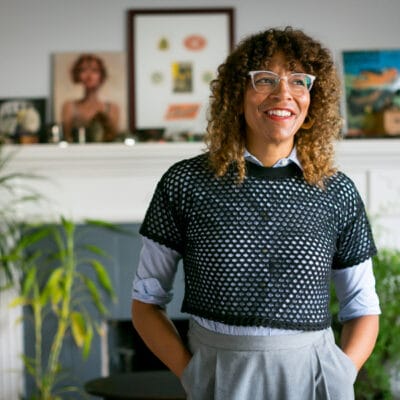 Bio:
Bio:
Julie Tinker has spent her career working in social impact as a design thinker, strategist, and creator of health solutions. She has had the pleasure of working with large foundations like the Kaiser Family Foundation, nonprofit organizations like International Planned Parenthood, and mission-driven corporations like Seventh Generation.
Prior to returning to Hopelab, Julie served as the design director at ETR (Education, Training & Research) where her interest and experience in examining and improving health equity practices grew. Julie considers herself a champion for equity and belonging and is excited to combine her interests in community health, health equity, behavioral science, and design to consider how we might work towards more equitable health outcomes for young folks.
Julie holds a BA in Communication and MA in Sociology from Stanford University and an MFA in Design from The School of Visual Arts in New York. A former professional athlete, Julie has made health and wellness the center of her family’s life through exercise, time outdoors, music, and dancing like nobody’s watching.
Related Content
View all Insights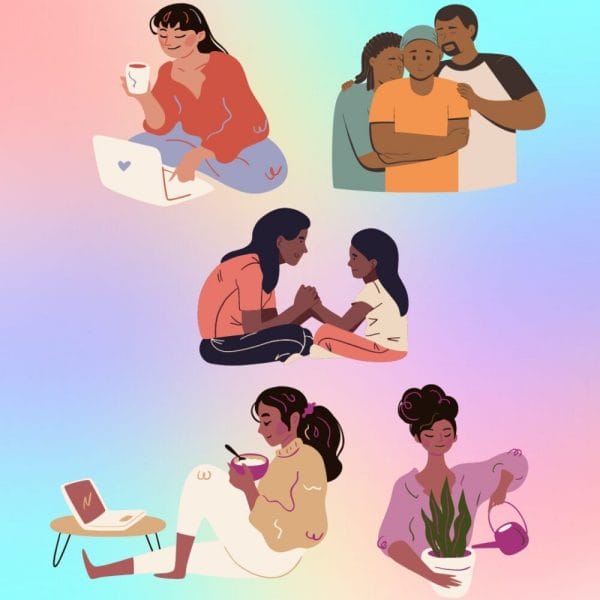
In partnership with Active Minds
A personal reflection from Active Minds blogger, Mya Vickers navigating opportunities to help improve the mental health of Indigenous people living on reservations.
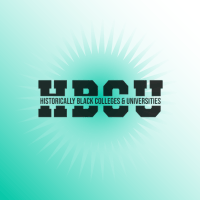
Part of the philanthropic sector’s commitment to equity must include tackling the impact of generations of systemic inequality and underfunding. We must remain steadfast when institutional and political forces try to scare us into backing away, not just during moments of heightened awareness around racial justice.
